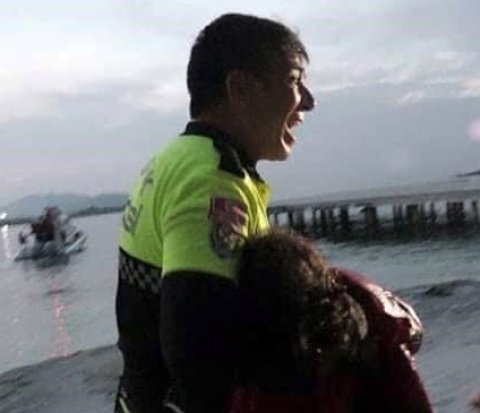This text is an adapted translation of a report by Palestinian journalist Yehya al-Yacoubi, published in Felesteen newspaper on October 25th, 2018.

It was a cold and quiet night in the Turkish port city of Bodrum, a tourist destination in the southwestern region of Turkey. A group of Palestinians from Gaza found themselves on the beach, but not as tourists. On the beach, stood Rabah Abu Jazar (33 years old), his pregnant wife, and their children thirteen year old Layan, eleven year old Malak, eight year old Sama, six year old Samir, and three year old Judy. Rabah’s cousin, A’ed and his wife, their five year old son Ehab and two year old Raw’a were also there.
They stood on the shore waiting for a refugee smuggler whom they paid to get their families on a tourist yacht from Turkey to the Greek island of Kos. For the families, crossing to Kos would highlight the end of a grueling exodus that began earlier this year. In his detailed report in Felesteen newspaper, Palestinian journalist Yehya al-Yacoubi shares the horrifying accounts of the tragedy that befell the Abu Jazar family.
The story of Rabah and his cousin A’ed’s attempt to get their families to Greece started when they applied for Turkish visas in March 2018. After six months of back and forth, they got their visas and left the Gaza Strip through the Rafah crossing between Gaza and Egypt. For large families, crossing to Egypt through Rafah can be a nightmare. Both families spent their night in the Rafah crossing waiting for their turn to cross to Egypt. “The floor was their bed, and the sky was their cover,” wrote al-Yacoubi, explaining what many Palestinians experience while trying to cross from Gaza to Egypt.
After an exhausting trip from Rafah city in southern Gaza, across the Sinai desert and to Cairo international airport, both families finally arrived in Istanbul in late September. Once in Turkey, they faced the hard choice of whether to continue to Europe “in search of their children’s future,” in Rabah’s words. They decided to continue their difficult journey and take the sea route to Europe.
For days, both families worked out arrangements with smugglers, a business in Turkey that has grown rapidly in light of the Syrian refugee crisis. The smugglers gave their clients instructions on where and when to meet at the beach. In many instances, smugglers abort their missions last minute due to coast guard activities. Every time a boat operation is aborted, desperate refugee families are forced to walk for hours back to where they came from. This happened once to the Abu Jazar families. After walking for four hours in order to find the designated crossing point to Europe, the crossing was aborted due to the presence of the coast guard.
On Monday, October 22nd, the hired smuggler contacted the Abu Jazars and urged them to meet somewhere near the shores of Bodrum at 1:00 am. According to al-Yacoubi, the Abu Jazar family paid the smuggler $1,600 per each person, including the children. The agreement was that they would end up crossing to Greece on a tourist yacht.
The families arrived at the meeting point, and hours passed while they waited for their “tourist yacht,” as they were promised by the smuggler. And at around 5:30 am, the smuggler arrived in a rusty small wooden boat. The families were shocked, as no tourist yacht arrived, even after all the money they spent. What added to their shock was the size of the traveling group which had reached thirty people. All were expected to board the same boat. According to al-Yacoubi, Abu Jazar had agreed with the smuggler that no more than 15 people would cross that night.
The smuggler threatened that if they did not accept the conditions for the travel, they would lose the money they spent. Under pressure and fearing this could be their only chance to leave, both families decided to board the boat. Once on board they looked around and noticed that no life vest, jackets, or any safety and floatation devices were provided. Fortunately, Rabah’s pregnant wife had a life vest that she brought with her, and the kids carried simple balloon-like floating aids.
The boat set sail, but shortly after it left the shore water started to fill the base of the boat. People on board started to panic. Rabah and A’ed started screaming and other passengers were terrified. The smuggler jumped out of the boat and left his passengers to meet their destiny.
In a state of panic passengers were jumping and moving about as the boat started to sink. In that moment, Rabah and A’ed made sure to have their kids cling to the floating balloons and help get their wives and kids to the beach. As they were helping their wives and other kids make it to the beach, the fathers noticed that one of the other passengers in the sinking boat took the floating balloon that Malak and Layan were holding onto as they waited for their father to come back. Layan managed to swim and reach her sister Sama who was holding to another floating balloon. Malak disappeared into the sea once her floating balloon was taken.
The coast guard arrived on the scene, and Rabah rushed to ask them to search for his daughter. Twenty minutes later, the guards noticed a body floating in the sea and rushed to discover that it was Malak. That was the moment cameras on shore captured: A Turkish coast guard running on the beach, carrying Malak who was struggling with her last breaths. The rescuer ran fast and managed to put Malak in an ambulance by the beach. Shortly after, Malak’s heart stopped, and her rescuer was in tears.
The tragedy of the Abu Jazar family is not a rare event. In the past years, a growing number of Palestinians from the Gaza Strip are leaving to destinations in Europe and other parts of the world. This happens as a result of the continuing blockade on Gaza which has led to collapse in almost every aspect of people’s lives in Gaza. This story is yet one more example of how Gaza tragedies extend beyond the narrow confines of the Strip. Palestinians from Gaza who are fortunate to gain permits to leave behind the challenges of the blockade face new uncertainties and challenges in a world where millions of refugees migrate escaping war and catastrophes. The question remains, until when will the blockade that has made Gaza unlivable and life in it, unbearable end?

